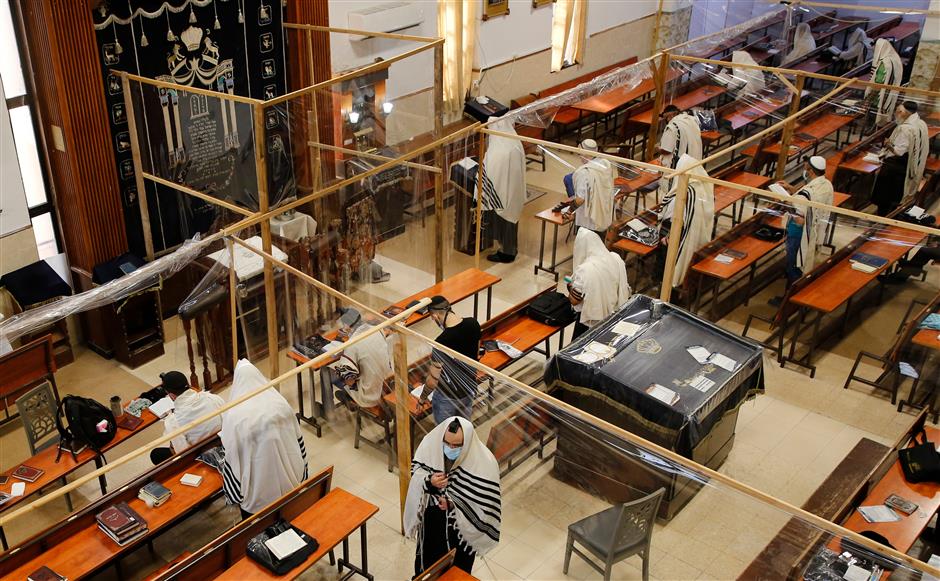No honey apples in Israel this year due to COVID-19

Ultra Orthodox Jewish men pray at the synagogue, separated by plastic cells, amid the coronavirus pandemic crisis, in the central Israeli city of Rehovot, on Wednesday.
Eating apples dipped in honey on Rosh Hashanah is a Jewish tradition to symbolize a sweet start of the New Year. But in Israel, bitterness prevails on the eve of the holiday as the country faces a second nationwide lockdown to stem a raging coronavirus outbreak.
Prime Minister Benjamin Netanyahu’s government has imposed a three-week lockdown, beginning from Friday’s afternoon — just hours before Rosh Hashanah starts.
Israel’s first lockdown, in March and April, put a damper on Passover, the Jewish spring holiday marking the deliverance of the ancient Hebrews from slavery in Egypt.
Now, the Jewish New Year seems to be similarly subdued.
Israel has seen new daily COVID-19 cases skyrocket in recent weeks, climbing to more than 5,000 on Wednesday — one of the highest per capita infection rates in the world.
Since the pandemic began this year, it has recorded more than 169,000 cases, including 1,163 deaths, as of Wednesday, according to Health Ministry figures.
Religious and secular Israelis alike mark Rosh Hashanah with festive holiday feasts with family and friends. They pack synagogues, often spending hours in prayer, especially during the fast of Yom Kippur, the Day of Atonement, which falls later this month.
But this year, traditional family gatherings will be muted, synagogue prayers will be limited to small groups and travel restrictions will leave many roads deserted.
Movement during the lockdown will be restricted to within 500 meters of one’s home. Gatherings are limited to 10 people indoors, and 20 outside, restricting the number who can attend synagogue services.
Bars, restaurants, and cultural venues will be shut, but many ritual baths and other religious facilities will remain open.
With gatherings in synagogues limited to 10 worshipers, some Israelis are organizing services in courtyards and gardens.
At Jerusalem’s Western Wall, the holiest site where Jews can worship, the plaza is crisscrossed with dividers to allow small groups to pray.
Jerusalem’s Great Synagogue, an Orthodox congregation that has hosted many Israeli dignitaries over the decades, announced earlier this week that because of the pandemic, it would not hold Jewish New Year Holiday services for the first time since it opened in 1958.
“It’s heartbreaking,” said Zalli Jaffe, president of Jerusalem’s Great Synagogue.
“We believe that safety comes first. Sometimes we have to protect the congregation against the congregation.”
Israeli police are deploying thousands of officers to enforce the regulations, with violators facing hundreds of dollars in fines.
Still, officials are concerned many Israelis — skeptical of the government’s erratic and confusing rules — may defy the lockdown.
Health Ministry Director Hezi Levi urged Israelis against defying travel restrictions by visiting family and relatives for Friday night’s traditional holiday meal.

















